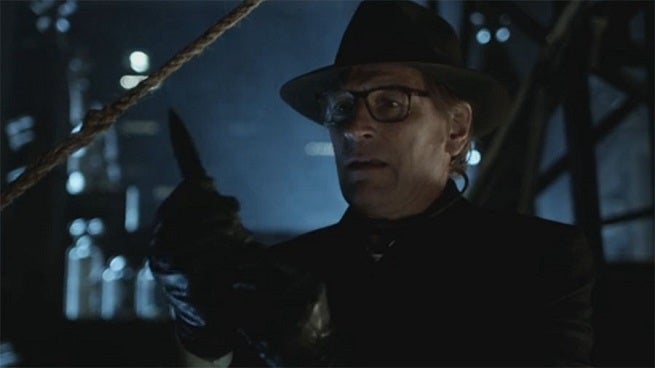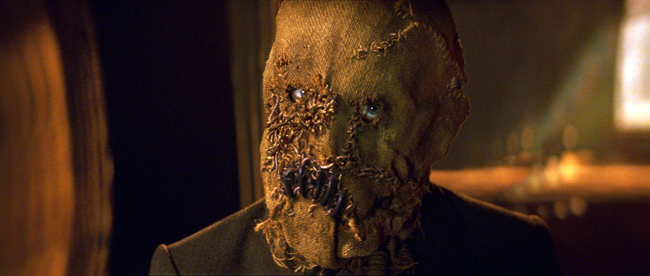Videos by ComicBook.com
Usually we would have just titled this story “Who is Dr. Crane?” — but whenever there’s no Easter eggs column, people wonder what happened…so I’m coming clean: I didn’t see anything.
If you guys did, feel free to shout it out, but everything I got was something that we’d already accounted for before.
So…Dr. Gerald Crane.
He’s never appeared in the comics, as far as I know, but he’s the father of the Batman villain known as The Scarecrow and, for the purposes of at least this episode and next, he’s the founder of that family business.
In the episode, he stole adrenal glands, taken immediately after a terrifying death by his victims, something that he could modify into the toxin used by Scarecrow to provoke fear in his victims.
Considering that the next episode is called “Scarecrow,” it seems pretty likely we’ll see that play out.
And, yes, we saw the actual Scarecrow…briefly. At the swimming pool, that teenager who came in to talk to his dad and get money for the parking meter was Jonathan Crane, who will eventually be The Scarecrow.
Scarecrow has appeared onscreen in a number of iterations before, most famously in the Arkham games and in Batman Begins, The Dark Knight and The Dark Knight Rises, played by Cillian Murphy.
Here’s an excerpt from our interview with actor Julian Sands, who played Dr. Crane this week:
When you’re stepping into Dr. Crane and a version of the Scarecrow, you have this general concept but since it’s really a new character, you get to put your own stamp on it. I can’t even remember if he was ever in the comics. Is that kind of the best of both worlds?
For me, the Dr. Crane I present is a person who quite genuinely believes that the lot of mankind can be improved if only I’m allowed to do my work. Yes, it may mean one or two people have to be sacrificed. Yes, there is a body count, but I am doing my work for the good of mankind. And when my son Jonathan is observing some of my work and I see him look tentative and unsure, I say, “Jonathan, we’ve talked about this. What I’m doing is for the good of mankind. It will make things better for everyone.”
Well, of course, not everyone because the person who is the subject of my experimentation is very quickly no longer with us, but I don’t see it that way. I mean, maybe I see it that way once it’s too late to reconsider. And I bring my son into my experimentation because I’ve run out of victims and I still haven’t found the elixir I’m looking for.
Crane is motivated by this desire to overcome fear. He believes fear is an evolutionary throwback to primordial times. He thinks it belongs with the three-celled slugs in the Andalusian oceans. He thinks that if mankind can conquer fear, then everybody will have a better life. What it really is, what he’s really trying to work out, is that he experienced personal trauma himself because he was afraid. That’s something, I think, that he never forgave himself for but was motivated to keep pursuing a cure.
Whereas I’m a mountain climber when I’m not acting and let me tell you: fear keeps you safe in life. Fear is a very good thing; it gets your antennae alert.
Did anybody see anything that was actually, y’know…hidden?










